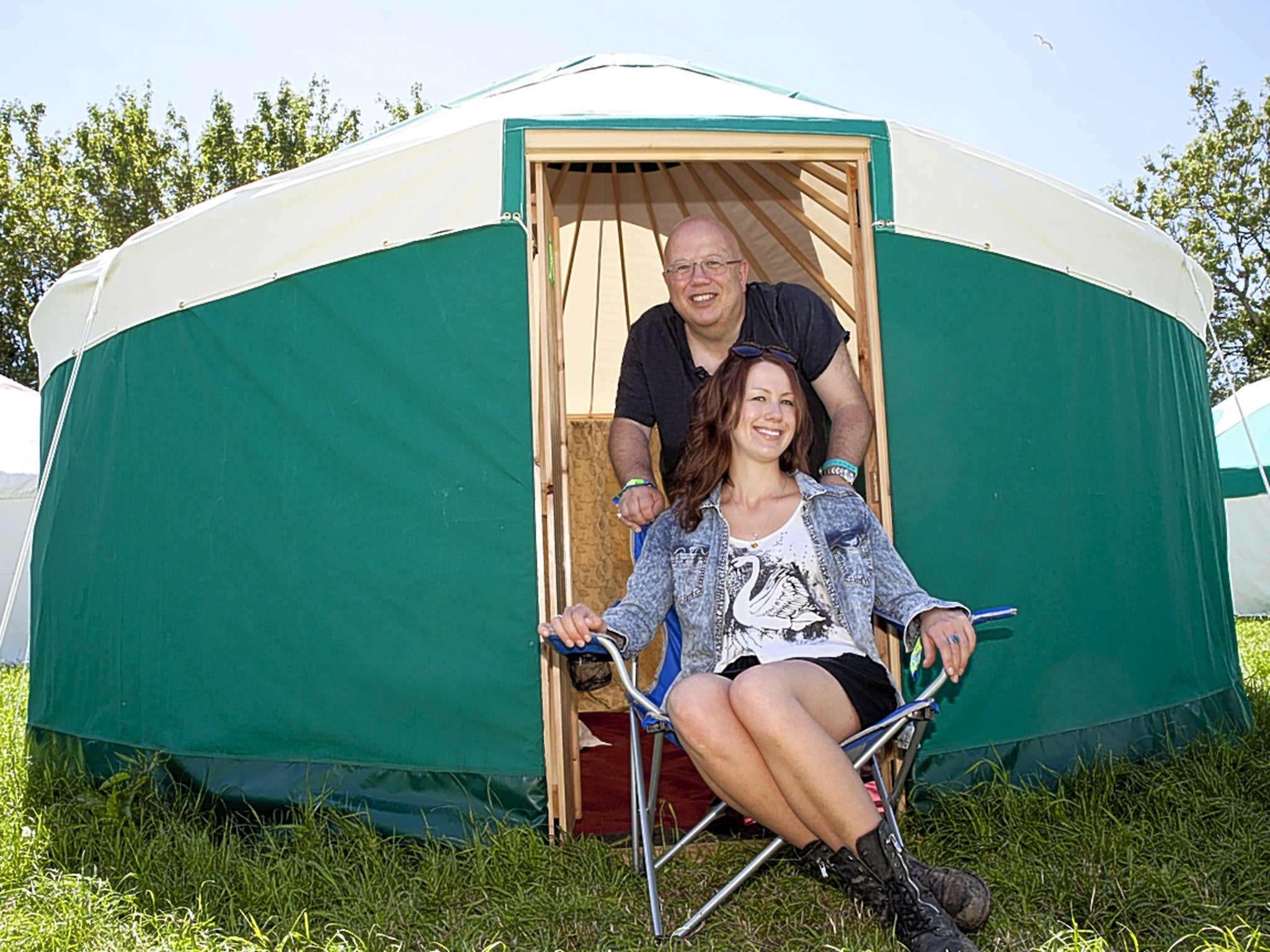The Rolling Stones weren't the only over-50s: My middle-aged Glastonbury was even better than the last time
Thirty years after his first festival, Chris Blackhurst rocks and rolls away the years with his grown-up daughter Daisy

If you'd told me, back in the mid-1980s (how long ago that seems) that one day I would be standing in a tent at Glastonbury with my 24-year-old daughter, arms aloft, singing along to The Smiths, I would have laughed. The idea of marriage and fatherhood and having a child in her mid-twenties, which was my age back then, seemed fanciful. Throw in the notion of us being at Glastonbury, then still very much a rough-and-ready hippie affair, with a capacity of 30,000, and it seemed ludicrous.
The Smiths have gone, my waistline has perished, and my hairline vanished. I've got five children, including two daughters, not just one. And Glastonbury is now an 180,000 behemoth.
But, late on Saturday afternoon, we were there, Daisy and me, at the John Peel Stage as Johnny Marr, once the band's guitarist, launched into a Smiths classic. Suddenly, the years rolled away. Men and women – some of them of a certain age but not all – were wreathed in smiles and literally hugging each other (not because they'd swallowed copious amounts of E, they did not need drugs to help them love this). It was a very special moment. When Marr finished, Daisy said, "God, that was really moving."
And so was Ben Howard, who I'd never really heard that much but Daisy said she played non-stop on a train trip across Europe, on the Pyramid Stage. As with Marr and me, she knew every word. So too were The Rolling Stones.
At no stage either did I feel as if I did not belong, that at 53, Glastonbury was not for me. It's not just because Marr is 49 and Jagger is 70 this month. Although that helps, and there's no doubt Michael Eavis, 77, the festival organiser, likes to mix it up – so there's something for everyone, from veteran acts to up and comers.
It's more than that. Forget the images of mud and pretty girls in designer wellies. What perhaps is not realised too widely is that Glastonbury is a serious event. It's not a pop festival, neither is it a rave or a rock-fest. Not for nothing does it call itself the Glastonbury Festival of Contemporary Performing Arts.
Eavis and his daughter, Emily, care deeply about the programme they produce. They aim to cover the whole spectrum, and not just in music, but in cabaret and comedy.
What's always struck me about Glastonbury is the knowledge of the crowd. Some of them may dress weirdly and yes, drugs aren't hard to find (although they are not so obviously available these days) but this is also an intelligent, discerning bunch (if that's what you can call 180,000 people).
They're open, too – to new artists, to ideas, to those who aren't like them. They are there to have a good time, and as long as you're of that same mind, nothing else matters.
Enjoy unlimited access to 70 million ad-free songs and podcasts with Amazon Music
Sign up now for a 30-day free trial
Enjoy unlimited access to 70 million ad-free songs and podcasts with Amazon Music
Sign up now for a 30-day free trial
What I do struggle with, I admit, are camping and the mud. As I've aged, so has my willingness to live without creature comforts diminished. If I can afford it I want my tent put up for me, I don't want to deal with ropes and pegs and poles. I want access to a flushing toilet and running water. I also desire more room so I'm not crammed in a field, with no space between the tents, falling over guy ropes in the dark, kept awake by the snoring of the bloke just inches away in the next tent.
Eavis knows this, too. So for those who wish to have them and can afford it, there are yurts, pods (think small garden sheds), tipis and motor homes.
This year, Daisy and I were in a yurt and it was bliss. We had our own lockable door, electricity, the ability to charge our phones, and comfy beds.Daisy would have put up with less. Likewise, she would withstand the mud, which, thank goodness, never materialised.
Glastonbury is about freedom. There's no compulsion to catch every gig (impossible anyway), nobody minds who you see and what you do, no one cares one iota how you look (once, in the Dance Tent, I thought the chap alongside must be hot because he'd taken his shorts off, then I glanced down and realised he was stark naked).
Once you enter those gates you leave the outside world, with its rules and conventions, pressures and harsh realities behind – and that's true of everyone, no matter their vintage.
On the way out of the Stones, the man to my right, in his early twenties judging by his appearance, turned to his female companion, and said: "I liked them because I knew all their songs." I knew them too. There may have been three decades between us but we had much in common.
As we roared with Johnny Marr on Saturday afternoon: "There Is a Light That Never Goes Out."
Subscribe to Independent Premium to bookmark this article
Want to bookmark your favourite articles and stories to read or reference later? Start your Independent Premium subscription today.

Join our commenting forum
Join thought-provoking conversations, follow other Independent readers and see their replies